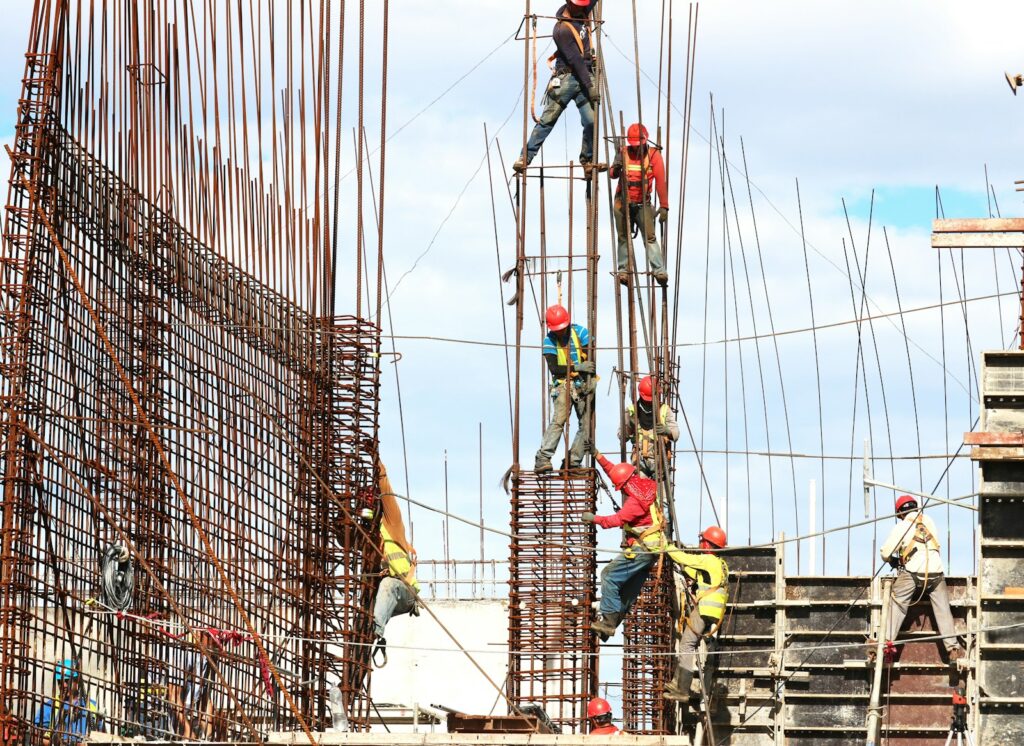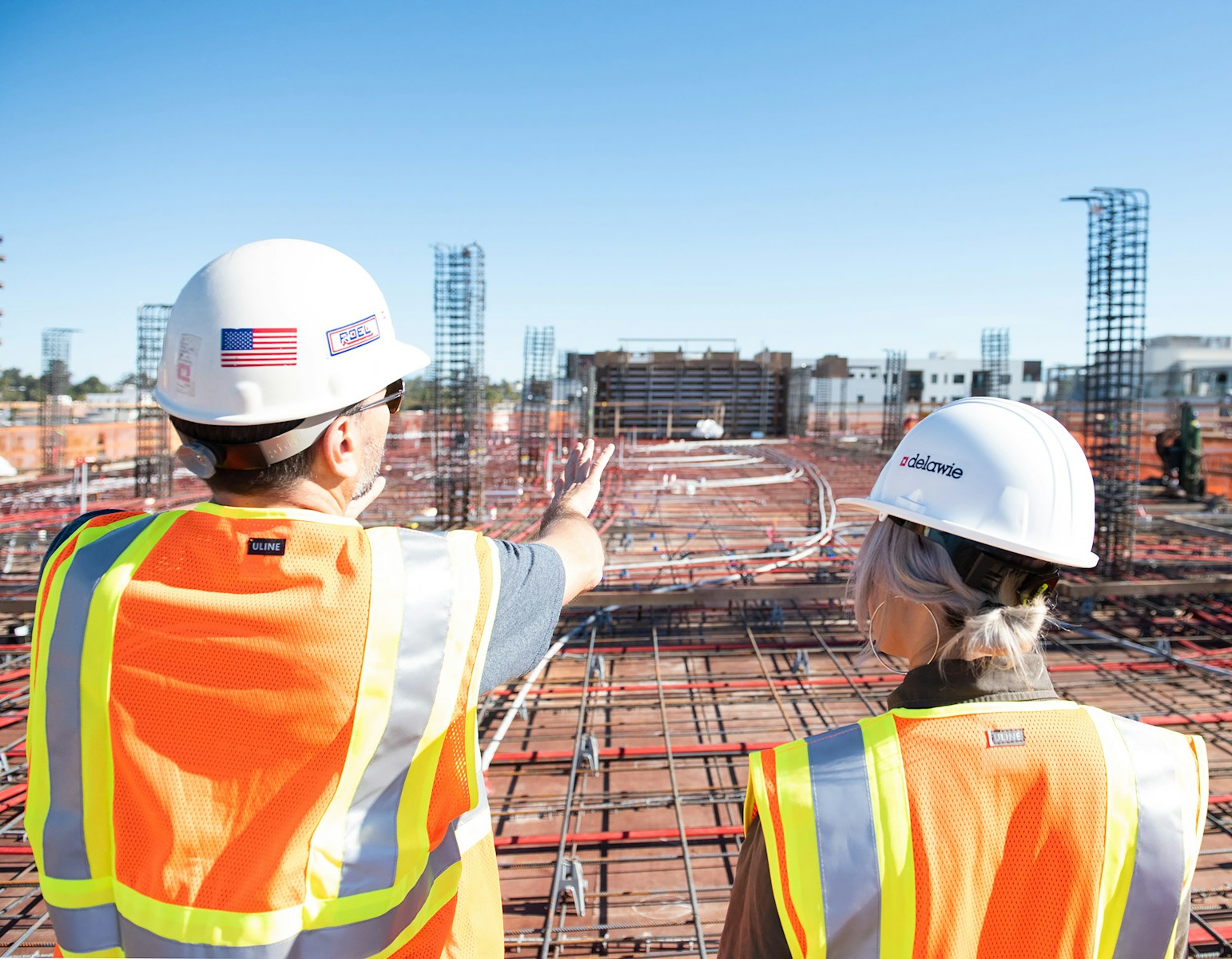Even the most skilled construction workers and talented architects can’t achieve greatness without proper coordination. That’s where construction project management comes in—it’s the invisible hand guiding each project to success.
At BB&A Construction Services, PLLC, we pride ourselves on delivering quality, innovation, and customer satisfaction in every project. In this blog post, we’ll explore the essential role of project management in the construction industry and how our approach can help you realize your vision.

What is Construction Project Management?
Construction project management is the process of guiding a project from initiation to completion, ensuring that it meets the client’s requirements, stays within budget, and adheres to the timeline. It’s a crucial aspect of the construction industry, where complexity and scale can easily lead to chaos without proper oversight.
This process involves a series of phases, known as the project life cycle, which includes initiation, planning, execution, monitoring, and closure. Each phase is vital for ensuring that construction managers, project teams, and stakeholders stay aligned with the project’s goals.
A construction manager oversees the entire construction process, coordinating various aspects such as scheduling, resource allocation, cost management, and compliance with quality and safety standards.
The role of construction project managers is pivotal to keeping projects on track. They are responsible for various tasks, including managing contracts, coordinating with contractors, and ensuring that all activities comply with regulations and standards. Their expertise and leadership are critical for navigating the construction landscape and delivering successful construction projects.

Construction Project Management Process
The construction project management process is a structured approach that guides the planning, execution, and delivery of a construction project. It involves the meticulous coordination of various stakeholders, including the project owner, architects, engineers, contractors, and subcontractors.
This process ensures that all aspects of the project are aligned with the client’s vision and requirements, from the initial concept to the final handover. By following a systematic approach, construction project managers can effectively manage resources, timelines, and budgets, leading to successful project outcomes.
Project Initiation
Project initiation is the critical first phase of the construction project management process. During this phase, the project scope, goals, and objectives are clearly defined. The project owner identifies the need for the project and outlines the specific requirements that must be met.
A project manager is appointed to lead the project, and a project team is assembled. This phase also includes conducting a feasibility study to assess the project’s viability, ensuring that it is both achievable and aligned with the client’s expectations. By laying a solid foundation during the initiation phase, the project is set up for success from the very beginning.
Project Planning
Project planning is the second phase of the construction project management process and is crucial for setting the stage for successful project execution. In this phase, a detailed project plan is developed, encompassing the project schedule, budget, and resource allocation. The project manager creates a project charter that outlines the project’s objectives, scope, and key stakeholders.
This comprehensive plan is developed in close consultation with the project team and stakeholders to ensure that all aspects are considered. Additionally, potential risks are identified and assessed, and mitigation strategies are developed to address these risks proactively. Effective planning is essential for keeping the project on track and within budget.
Project Execution
Project execution is the third phase of the construction project management process, where the actual construction work takes place. This phase involves the procurement of materials, labor, and equipment necessary to complete the project.
The project manager plays a pivotal role in overseeing the construction activities, ensuring that they are carried out according to the project plan, on time, within budget, and to the required quality standards. Managing changes to the project scope, schedule, or budget is also a key responsibility during this phase. Effective execution requires diligent oversight and coordination to ensure that all project components come together seamlessly.
Project Monitoring and Control
Project monitoring and control is the fourth phase of the construction project management process, focusing on tracking the project’s progress and ensuring it stays on course. The project manager continuously monitors the project’s schedule, budget, and quality, identifying any deviations from the project plan.
When issues arise, corrective actions are taken to realign the project with its objectives. This phase also involves regular reporting to the project owner and stakeholders, providing updates on the project’s status and addressing any concerns. By maintaining vigilant oversight and control, the project manager ensures that the project remains on track and meets its goals.
By understanding and effectively managing each phase of the construction project management process, project managers can deliver successful projects that meet client expectations and industry standards.

Key Components of Successful Construction Projects
Successful construction projects rely on meticulous planning. Project planning involves defining the project scope, creating a detailed schedule, and setting a realistic project budget. This planning phase is the foundation upon which the entire project is built, as it outlines the project’s objectives, deliverables, and timelines.
A construction project management team is crucial in ensuring the successful execution of complex construction projects. This team collaborates among professionals in architecture, engineering, and project management to address various challenges throughout the construction process. Risk management and resource allocation are also essential components of project execution.
By identifying potential risks early and planning accordingly, construction project managers can mitigate setbacks and keep the project on track. Resource allocation ensures that the necessary materials, equipment, and personnel are available when needed, optimizing project execution and minimizing delays.
Effective communication, collaboration, and leadership are the glue that holds the project team together. Project managers must foster open communication among team members, contractors, and stakeholders to ensure everyone is on the same page. Collaboration and leadership skills are vital for maintaining morale, resolving conflicts, and keeping the project progressing smoothly.

Construction Project Management Tools and Technologies
Construction project management software has revolutionized the construction industry by highlighting key features and functionalities designed to assist construction professionals in executing their projects effectively. These technologies streamline project planning, scheduling, and monitoring, making it easier for construction managers to manage projects efficiently.
Various project management software options cater to different needs. For instance, some tools focus on scheduling, while others emphasize budgeting or document management.
A construction project management tool serves as a centralized platform for communication among diverse stakeholders, facilitating real-time updates and streamlining various aspects of project management to enhance efficiency and coordination. By leveraging these technologies, construction teams can improve communication, track progress, and make data-driven decisions.
Case studies have shown that using advanced construction project management tools, categorized into traditional and modern types, can significantly enhance project outcomes.
For example, a construction firm that adopted a cloud-based project management system saw a 20% improvement in project delivery times. These tools enable project managers to monitor progress in real-time, identify potential issues, and make informed decisions to keep the project on track.

Best Practices in Construction Project Management
Adopting industry best practices is crucial for effective construction project management. These practices help ensure that projects are completed on time, within budget, and to the highest quality standards.
Gaining project management skills is essential for individuals entering the construction industry, highlighting the importance of relevant education, such as degrees in construction management, engineering, or related fields. Community colleges can provide valuable courses that enhance these skills, particularly for those working on smaller projects or pursuing associate degrees.
To overcome common challenges such as delays, budget overruns, and safety issues, project managers must focus on proactive risk management and dynamic resource allocation. By anticipating potential problems and allocating resources strategically, they can mitigate setbacks and maintain project momentum.
Another best practice is to continually assess and refine project management strategies. By learning from past projects and implementing improvements, construction managers can enhance their skills, optimize processes, and increase the likelihood of project success.

The Future of Construction Project Management
The construction industry is constantly evolving, with emerging trends and technologies shaping the future of project management. The landscape of construction project management jobs is also evolving, offering a variety of roles for both seasoned professionals and newcomers.
Understanding specific job requirements, such as education, skills, and experience, is crucial for those looking to enter or advance in this field. Sustainability, digital transformation, and AI are at the forefront of this revolution, offering new opportunities for innovation and efficiency.
Sustainable construction practices prioritize environmental responsibility and resource conservation. By incorporating green building techniques and materials, construction firms can reduce their environmental impact and contribute to a more sustainable future.
Digital transformation and AI are revolutionizing the construction management landscape. Technologies such as Building Information Modeling (BIM), drone surveying, and AI-driven analytics are enabling construction managers to gather valuable insights, optimize processes, and make data-driven decisions.
These advancements are streamlining construction project management and paving the way for more efficient, cost-effective, and successful projects.

Conclusion
Effective construction project management is the key to ensuring the success of construction projects. By understanding the project life cycle, leveraging the right tools and technologies, and adopting industry best practices, construction managers can deliver high-quality, on-time, and within-budget projects.
At BB&A Construction Services, PLLC, we are committed to innovation and client satisfaction. Our expertise in construction project management, combined with our dedication to quality and collaboration, ensures that we consistently exceed client expectations.
To learn more about how we can help you achieve your construction goals, visit our website and explore our range of services.

Resources
To further enhance your understanding of construction project management and stay informed about the latest industry trends, consider exploring the following resources:
-
Construction Management Association of America (CMAA): Provides valuable resources, including webinars, publications, and certifications aimed at construction management professionals.
-
Lean Construction Institute (LCI): Focuses on improving project delivery methods and efficiency through the principles of lean construction.
-
National Institute of Building Sciences (NIBS): Offers comprehensive information on building sciences, sustainable building practices, and innovative construction technologies.
-
American Society of Civil Engineers (ASCE): Provides technical resources, industry news, and networking opportunities for professionals in civil engineering and construction.
-
Royal Institution of Chartered Surveyors (RICS): Provides guidance, professional standards, and education opportunities for surveyors and construction professionals around the globe.
-
U.S. Green Building Council (USGBC): Offers resources and certification programs focused on sustainable building practices and the LEED green building rating system.
-
Society of Construction Law (SCL): Shares knowledge on the best practices and legal aspects of construction, offering resources such as articles, events, and newsletters for construction law professionals.
-
Chartered Institute of Building (CIOB): Supports construction professionals with development courses, industry reports, and a range of events focused on advancing excellence in the built environment.
-
BuildingSMART International: Promotes open standards for BIM implementations, offering knowledge resources for the improvement of construction industry productivity through interoperable solutions.
These resources offer valuable insights and tools to help you excel in construction project management and stay at the forefront of industry advancements.

